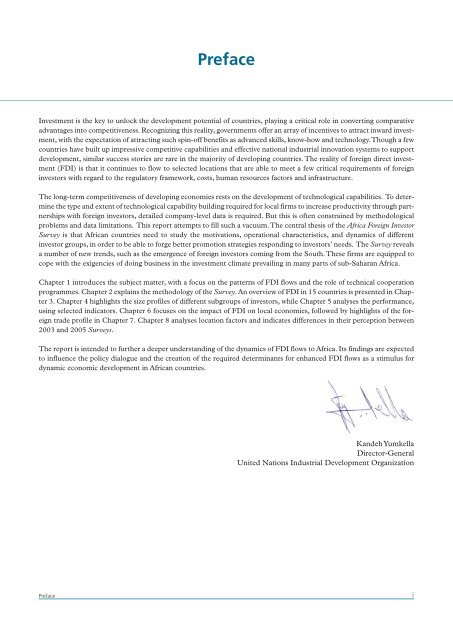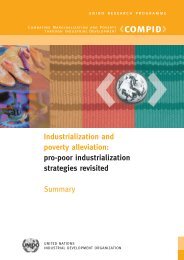Africa Foreign Investor Survey 2005 - unido
Africa Foreign Investor Survey 2005 - unido
Africa Foreign Investor Survey 2005 - unido
You also want an ePaper? Increase the reach of your titles
YUMPU automatically turns print PDFs into web optimized ePapers that Google loves.
Preface<br />
Investment is the key to unlock the development potential of countries, playing a critical role in converting comparative<br />
advantages into competitiveness. Recognizing this reality, governments offer an array of incentives to attract inward investment,<br />
with the expectation of attracting such spin-off benefits as advanced skills, know-how and technology.Though a few<br />
countries have built up impressive competitive capabilities and effective national industrial innovation systems to support<br />
development, similar success stories are rare in the majority of developing countries. The reality of foreign direct investment<br />
(FDI) is that it continues to flow to selected locations that are able to meet a few critical requirements of foreign<br />
investors with regard to the regulatory framework, costs, human resources factors and infrastructure.<br />
The long-term competitiveness of developing economies rests on the development of technological capabilities. To determine<br />
the type and extent of technological capability building required for local firms to increase productivity through partnerships<br />
with foreign investors, detailed company-level data is required. But this is often constrained by methodological<br />
problems and data limitations. This report attempts to fill such a vacuum.The central thesis of the <strong>Africa</strong> <strong>Foreign</strong> <strong>Investor</strong><br />
<strong>Survey</strong> is that <strong>Africa</strong>n countries need to study the motivations, operational characteristics, and dynamics of different<br />
investor groups, in order to be able to forge better promotion strategies responding to investors’ needs. The <strong>Survey</strong> reveals<br />
a number of new trends, such as the emergence of foreign investors coming from the South.These firms are equipped to<br />
cope with the exigencies of doing business in the investment climate prevailing in many parts of sub-Saharan <strong>Africa</strong>.<br />
Chapter 1 introduces the subject matter, with a focus on the patterns of FDI flows and the role of technical cooperation<br />
programmes. Chapter 2 explains the methodology of the <strong>Survey</strong>. An overview of FDI in 15 countries is presented in Chapter<br />
3. Chapter 4 highlights the size profiles of different subgroups of investors, while Chapter 5 analyses the performance,<br />
using selected indicators. Chapter 6 focuses on the impact of FDI on local economies, followed by highlights of the foreign<br />
trade profile in Chapter 7. Chapter 8 analyses location factors and indicates differences in their perception between<br />
2003 and <strong>2005</strong> <strong>Survey</strong>s.<br />
The report is intended to further a deeper understanding of the dynamics of FDI flows to <strong>Africa</strong>. Its findings are expected<br />
to influence the policy dialogue and the creation of the required determinants for enhanced FDI flows as a stimulus for<br />
dynamic economic development in <strong>Africa</strong>n countries.<br />
Kandeh Yumkella<br />
Director-General<br />
United Nations Industrial Development Organization<br />
Preface<br />
i
















